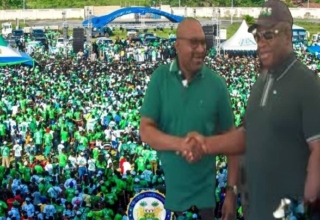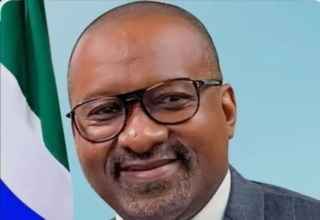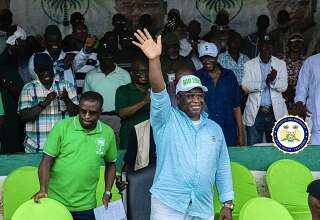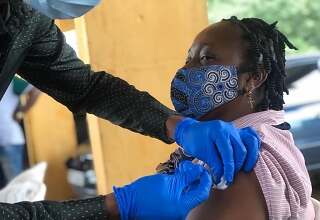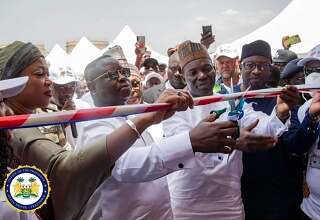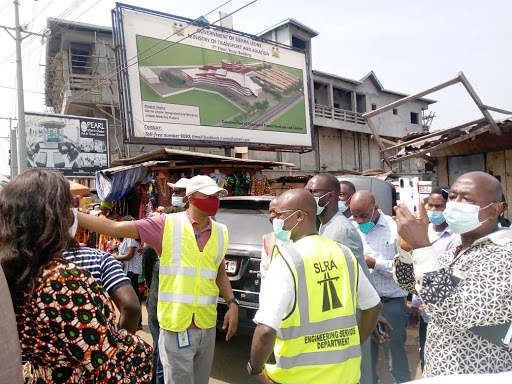
The Sierra Leone Roads Authority (SLRA) has embarked on series of public engagements to clear and reclaim the Rights-of-Way across the country. The purpose of the clearance, among other things, is to enhance safety and sanity along the national road network.
The Rights-of-Way is a demarcated portion of land that spans 30 metres from the centre line to either side of the road for major highways, 20 metres for urban township roads and 6 – 10 metres for rural roads. This portion of land is normally reserved for future expansion of the road and the installation of utility services including water pipes, electricity and fibre cables.
On Tuesday, June 8, 2021, the SLRA, together with the Ministry of Works and Public Assets, held a meeting with key stakeholders, including the Freetown City Council, Western Area Rural District Council, Ministry of Lands, Housing and Country Planning, Office of National Security (ONS), Road Maintenance Fund Administration (RMFA), Sierra Leone Police, Traders Council and Civil Society. These key partners discussed the magnitude of encroachments on the Rights-of-Way, the effect of the encroachments and the urgent need to reverse the encroachments.
While addressing stakeholders in the conference room of the Ministry of Works and Public Asset at New England in Freetown, Minister of Works and Public Asset, Mr. Peter Bayuku Konteh, stated that the country had over the years been faced with a problem of people illegally encroaching on the Rights-of-Way. “There is no normal Sierra Leonean who does not want to see a beautiful, orderly and safe Sierra Leone,” He lamented.
Mr. Konteh described the act of encroachment as a national problem that requires prompt action. He opted to provide the political leadership to address the problem. He called all the relevant authorities and stakeholders to support the SLRA in enforcing the clearance of the Rights-of-Way as the operation could require engagement, logistics and security.
The Director General of the Sierra Leone Roads Authority, Ing. Amara Jambai Kanneh, explained that the operation will be done along newly constructed roads where most of the property affected owners had been compensated, makeshift and newly built permanent structures, and target street garages and trading. He added that other critical permanent structures will be listed and the owners will be paying lease for occupying the Rights-of-Way.
The Authority has over the years spent huge amount of money to pay compensation for the acquisition of Rights-of-Way to property affected owners for several road projects. To date, the Government of Sierra Leone
(GOSL) has paid compensation of Le6.2 billion for the Bo-Bandajuma Road project, Le4.5 billion for the Bandajuma-MRU Bridge, Le3.5 billion for the Hillside Bye Pass Road, Le18 billion for the Wellington –Masiaka Road, Le7 billion for the Moyamba-Moyamba Junction Road and Le4.5 billion for the Pendembu –Kailahun Road respectively.
All stakeholders present acknowledged the burden caused by encroachments on the Rights-of-Way, and pledged to support the SLRA to clear illegal occupants on the roads.
The Vice President of the Traders Council, Foday Sahid Kamara thanked SLRA for the engagement and acknowledged that there was no law that permits people to trade on the street. However, he stated that most of their memberships are engaged in street trading because they do not have suitable locations to trade.
Mr. Kamara encouraged the Government to review the Retail Act, which could prevent wholesalers from doing retail business and also, speed up the construction of bigger markets, including Sewa Grounds, which can host several traders.
He appealed to the SLRA to extend the start date of the clearing exercise to enable them to properly engage their membership.
Also, the SLRA held community engagements with stakeholders at the Jui Community Centre and the Lumley-Grassfield Community Centre on June 9 and 10 respectively. Similar community and media engagements will be held in the North, South and East of the country before the actual clearance exercise begins at a later date.

